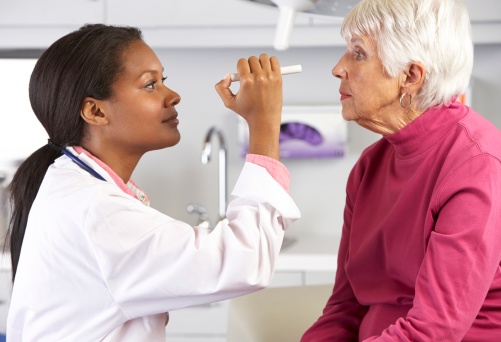By Kate Ranta on Feb 11, 2015 @ 02:48 PM
Is your vision blurry? Have you been seeing doubles lately? Just one more question: do you have diabetes? The fact is, diabetes and vision are connected. In fact, according to the American Diabetes Association, most people with diabetes have minor eye disorders, or have high risk of blindness. The good news is that there are treatments for vision problems related to diabetes. This is especially true if the problem is caught early. When it comes to diabetes and vision, it’s important to get the right diagnosis and treatment as soon as possible.
Three Ways Diabetes Affects Vision
Can diabetes affect your eyesight? Generally, if your blood sugar is too high, it will affect both the lenses of your eyes and/or the retina. Three eye diseases may result: glaucoma, cataracts or diabetic retinopathy.
Glaucoma: Glaucoma is a buildup of too much pressure in the eye. The pressure can damage the nerves and blood vessels inside your eyes.
There are two types of glaucoma. Open angle glaucoma—the most common type—offers virtually no early warning signs, unfortunately. Acute angle-closure glaucoma, however, comes with one or more of these signs:
- Headaches
- Eye pain
- Blurred vision
- Watery eyes
- Halos around lights
- Vision loss
Glaucoma can result in blindness if left untreated.
Cataracts: Cataracts affect the eyes’ lenses. If you have cataracts, your lenses become cloudy. This makes your vision seem foggy or blurred. Cataracts worsen over time if left untreated. The American Diabetes Association reports that people with diabetes are 60 percent more likely to have cataracts.
Diabetic Retinopathy: This occurs when diabetes has affected your retina’s blood vessels. Among the three eye diseases, diabetic retinopathy is the most serious. The longer you have had diabetes, the higher your risk is. If not caught early or if left untreated, it is permanent and will result in blindness.
This disease often shows no early warning signs. Regular eye exams may be the only way to know you have this disease.
Treatments
- Your doctor can treat your glaucoma with eye drops, medicines that reduce eye pressure, laser procedures, and/or surgery, depending on your situation.
- Your doctor can treat your cataracts with a simple surgery that is performed often with a high rate of success.
- Treating diabetic retinopathy is more successful when it is caught early. Treatment can be a laser procedure or surgery, depending on how advanced your disease has become.
If you have diabetes, be sure to control your blood sugar levels, and protect your vision with vision check-ups. The key to preventing blindness is regular eye exams.
Want to have Solstice benefits? Call our sales team at 877.760.2247 or email Sales@SolsticeBenefits.com
Already have Solstice benefits? See your plan details by going to https://www.mysmile365.com/ or calling us at 1.877.760.2247.





comments